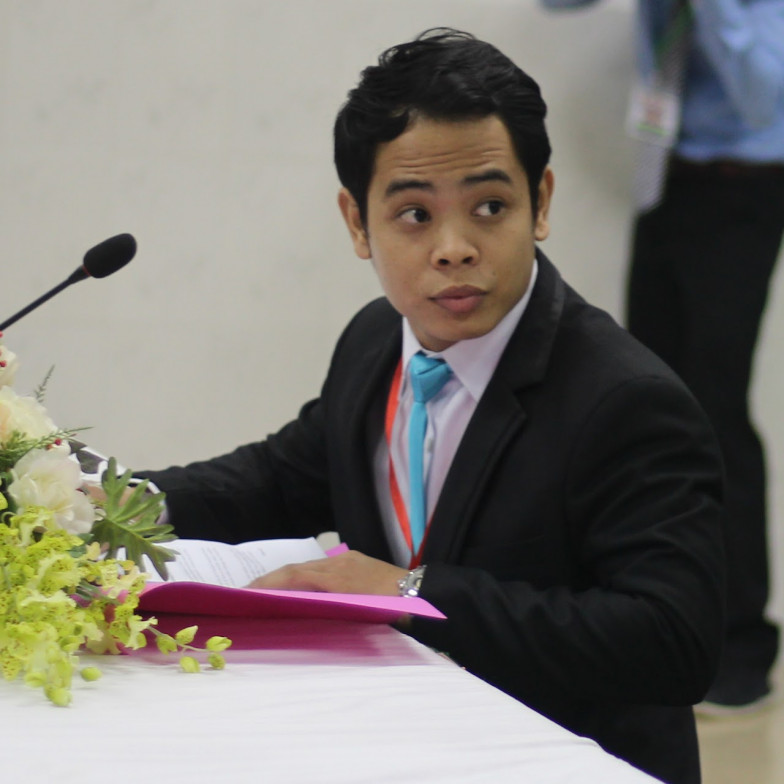Politik
Koffee
Podcast
ក្រុមកាហ្វេនយោបាយបើកគេហទំព័រឲ្យយុវជនសរសេរបញ្ចេញមតិដោយសេរី
Cambodian leader's love-hate relationship with Facebook
As Demographics in Cambodia Shift, Youth Seek Political Change
With connectivity boom, Cambodia's political battles shift online
Debate
ការប្រើប្រាស់បណ្តាញសង្គម ធ្វើឱ្យយើងបង្កើនចំណេះដឹងផ្នែកព័ត៌មាន (#អក្ខរកម្មព័ត៌មាន)
ឡេង ហ៊ីវហ្វី
Moderator
ជម្រាបសួរប្រិយមិត្តកាហ្វេនយោបាយ និងជនរួមជាតិជាទីស្រលាញ់រាប់អាន។ សូមស្វាគមន៍មកកាន់វេទិកាតទល់មតិរបស់យើងទាំងអស់គ្នាសាជាថ្មីម្តងទៀត។ បច្ចេកវិទ្យាបានធ្វើឱ្យទំនាក់ទំនងមានភាពងាយស្រួល និងរហ័សទាន់ចិត្ត។ ទន្ទឹមនឹងនេះដែរ បណ្តាញសង្គមបានក្លាយជាផ្នែកមួយដ៏សំខាន់ដែលធ្វើឱ្យការទំនាក់ទំនង ទទួល និងចែករំលែកព័ត៌មាន កាន់តែមានងាយស្រួលមួយកម្រិតទៀត សម្រាប់ជីវិតប្រចាំថ្ងៃរបស់ប្រជាជនកម្ពុជា ក៏ដូចមនុស្សជុំវិញពិភពលោក។ នាឆ្នាំ២០២២នេះ កម្ពុជាមានអ្នកប្រើប្រាស់អ៊ីនធឺណិតប្រហែល ១៧.៧ លាននាក់ (ម្នាក់អាចប្រើឧបករណ៍ច្រើនជាងមួយ) នេះបើយោងតាមនិយតករទូរគមនាគមន៍កម្ពុជា។ សម្រាប់អ្នកប្រើប្រាស់បណ្តាញសង្គម ចំនួនអ្នកប្រើប្រាស់ហ្វេសប៊ុកនៅប្រទេសកម្ពុជានៅឆ្នាំ២០២២នេះ មាន១១លាន៦ គណនី ( ម្នាក់អាចប្រើច្រើនជាងមួយគណនី) យោងតាមរបាយការណ៍របស់ Datareportal។ ចំនួនអ្នកប្រើប្រាស់TikTokនៅកម្ពុជា មានចំនួន ៦,៦៨លានគណនី (ម្នាក់អាចប្រើច្រើនជាងមួយគណនី) នៅឆ្នាំ២០២២ (រាប់ចាប់ពីអាយុ១៨ ឆ្នាំឡើងទៅ)។ ការសិក្សាស្រាវជ្រាវ (Human-Centred Design Methods) របស់ Sour Mouyនៅចុងឆ្នាំ២០២១ បានឱ្យដឹងថា យុវជនជនបទជាមធ្យមចំណាយពេលប្រើប្រាស់បណ្តាញសង្គមប្រមាណជា ៤ម៉ោង ៤០នាទី (Facebook: 3h40m; TikTok: 25m; Youtube 25m; Instagram: 20m)។ ដោយមានការសហការជាមួយវេទិកាសួរមួយ ដែលកំពុងរៀបចំយុទ្ធនាការអក្ខរកម្ម ឌីជីថល ក្នុងគោលបំណងបង្កើនសមត្ថភាពការគិតស៊ីជម្រៅ និងការកំណត់ប្រភពព័ត៌មានដែលគួរឱ្យទុកចិត្ត ដើម្បីធ្វើសេចក្តីសម្រេចចិត្តឱ្យបានត្រឹមត្រូវក្នុងរយៈពេលវែង។ ដូច្នេះហើយប្រធានបទនៃការតទល់មតិលើកនេះគឺ «តើការប្រើប្រាស់បណ្តាញសង្គម ធ្វើឱ្យយើងបង្កើនចំណេះដឹងផ្នែកព័ត៌មាន (#អក្ខរកម្មព័ត៌មាន) ឬយ៉ាងណា?» យោងតាមអង្គការយូណេស្កូ៖ អក្ខរកម្មព័ត៌មាននិងប្រព័ន្ធ ផ្សព្វផ្សាយ ត្រូវបានកំណត់ថា ជាចំណេះដឹង និងជំនាញដែលត្រូវការ ដើម្បីស្វែងរកការវិភាគ វាយតម្លៃស៊ីជម្រៅ និងបង្កើតព័ត៌មាននៅក្នុងប្រព័ន្ធផ្សព្វផ្សាយ និងបរិបទផ្សេងៗ។ វាជួយអ្នកប្រើប្រាស់ឱ្យធ្វើការ ជ្រើសរើសត្រូវអំពីរបៀបដែលពួកគេចូលរួមក្នុងការកសាងសន្តិភាព សមភាព សេរីភាពនៃការបញ្ចេញមតិ ការសន្ទនា ការទទួលបានព័ត៌មាន និងការអភិវឌ្ឍប្រកបដោយចីរភាព។ វេទិកាតទល់មតិលើកនេះ យើងមាន លោក លី ជិងគួយ ខាងមតិស្រប និងកញ្ញា ហេង សុជា ខាងមតិបដិសេធ។ ពួកគេម្នាក់ៗជ្រើសរើសយកទឡ្ហីករណ៍ចំនួន៣យកមកបកស្រាយ។ គោលបំណងនៃការតទល់មតិនេះ គឺដើម្បីលើកកម្ពស់វប្បធម៌សន្ទនាប្រជាធិបតេយ្យក្នុងចំណោមយុវជននៅកម្ពុជា។ ដោយសារតែអ្នកទាំងអស់គ្នាអាចបោះឆ្នោតបានតែម្ដងប៉ុណ្ណោះ ដោយប្រើប្រាស់គណនីហ្វេសប៊ុក ដូច្នេះសូមអានការដេញដោលមតិនេះឲ្យបានល្អិតល្អន់ជាមុនសិន មុននឹងបោះឆ្នោតឱ្យបេក្ខជនរបស់យើង។ ក្រុមកាហ្វេនយោបាយ និងវេទិកាសួរមួយ មិនមានសិទ្ធិ និងមិនអាចដឹងបានទេថា អ្នកណាបានបោះឆ្នោតឱ្យបេក្ខជនមួយណា។ រាល់ការបោះឆ្នោតគឺសម្ងាត់ រយ:ពេលនៃការបោះឆ្នោតគឺពីរសប្ដាហ៍ ហើយអ្នកដែលទទួលបានភាគរយច្រើនជាងគេគឺជាអ្នកឈ្នះ។ បងប្អូនប្រិយមិត្តជនរួមជាតិទាំងអស់អាចចូលរួមបញ្ចេញមតិយោបល់ទៅលើការដេញដោលនេះនៅខាងក្រោមបាន!

លី ជិងគួយ
Agree
ជាការពិតណាស់ វិវឌ្ឍនភាពនៃប្រព័ន្ធបច្ចេកវិទ្យាបានធ្វើឱ្យការផ្សព្វផ្សាយព័ត៌មានវិវត្តន៍ក្លាយជាប្រព័ន្ធព័ត៌មានបែបរហ័ស រួមទាំងអាចដឹងពីបញ្ហាទាំងក្នុង និងក្រៅប្រទេសលឿនតាមបែបផែនថ្មី គឺប្រព័ន្ធបណ្តាញសង្គម។ ខ្ញុំជឿជាក់ថា ការប្រើប្រាស់បណ្តាញសង្គមធ្វើឱ្យមនុស្សបង្កើនចំណេះដឹងផ្នែកព័ត៌មាន ឬហៅថា #អក្ខរកម្មព័ត៌មាន។ ដូចនេះខ្ញុំនៅតែគាំទ្រទៅលើប្រធានបទខាងលើដោយមានទឡ្ហីករណ៍បីសំខាន់មកគាំទ្រ៖ ទឡ្ហីករណ៍ទី១៖ បណ្តាញសង្គមអាចជួយបង្កើនឱ្យមានការគិតបែបស៊ីជម្រៅក្នុងការធ្វើការសម្រេចចិត្តឱ្យត្រឹមត្រូវ កំណើននៃសារព័ត៌មានភាគច្រើនរមែងតែងផ្សព្វផ្សាយនៅតាមបណ្តាញសង្គមដោយសារប្រព័ន្ធបណ្តាញសង្គមបានជួយសម្រួលដល់ថវិការជាច្រើន ទៅដល់ភ្នាក់ងារសារព័ត៌មានក្នុងស្រុកដែលមានបំណងចង់ចាប់ផ្តើមការងារក្នុងវិស័យនេះ ជាមួយហិរញ្ញវត្ថុដែលមានកម្រិត។ ដូចនេះយើងឃើញថា គ្រប់សារព័ត៌មានរមែងតែងប្រើប្រាស់ និងផ្សព្វផ្សាយតាមរយៈបណ្តាញសង្គម ដែលវាញ៉ាំងឱ្យបណ្តាញសង្គមមានអ្នកប្រើប្រាស់ជាច្រើន ដែលសឹងតែអាចនិយាយបានថា បណ្តាញសង្គមគឺជាស្នូលនៃបណ្តុំព័ត៌មាន រួមទាំងការប្រាស្រ័យទាក់ទងក្នុងសង្គមទាំងក្នុងស្រុក និងក្រៅស្រុក។ ម្យ៉ាងវិញទៀត លំហូរនៃព័ត៌មានរបស់បណ្តាញសង្គមគឺមានយ៉ាងច្រើនដែលធ្វើឱ្យយើង ទទួលបានព័ត៌មានគ្រប់រូបភាព និងគ្រប់ជ្រុង ដែលអាចឱ្យអ្នកប្រើប្រាស់អាចវែកញែក និងវិនិច្ឆ័យហេតុ និងផលដែលមានភាពសុក្រឹត្យ និងត្រឹមត្រូវខ្ពស់ រួមទាំងអាចឱ្យអ្នកប្រើប្រាស់ទាំងអស់អាចដឹងថា ព័ត៌មានណាជាព័ត៌មានពិត និងប្រឌិត។ បណ្តាញសង្គមក៏ជាកន្លែងដែលអាចឱ្យអ្នកប្រើប្រាស់អាចបញ្ចេញមតិយោបល់ រួមទាំងអាចឱ្យអ្នកប្រើប្រាស់ទាំងអស់យល់ដឹង និងបង្កើតការគិតបែបស៊ីជម្រៅបានខ្ពស់ ដែលអាចឱ្យពួកគាត់មានការសម្រេចចិត្តត្រឹមត្រូវ រួមទាំងអាចវែកញែករកប្រភពនៃព័ត៌មានដែលពិតប្រាកដ។ ទឡ្ហីករណ៍ទី២៖ បណ្តាញសង្គមអាចផ្តល់ឱ្យមានកម្មវិធីក្នុងការទំនាក់ទំនង និងជួយអភិវឌ្ឍន៍ការចូលរួមយ៉ាងសកម្មក្នុងសង្គមរវាងប្រជាពលរដ្ឋ រដ្ឋាភិបាល និងអង្គការមិនមែនរដ្ឋាភិបាលដែលដើរតួសំខាន់នៅក្នុងសង្គម នៅក្នុងបណ្តាញសង្គម មិនមែនមានតែប្រជាពលរដ្ឋធម្មតានោះទេដែលប្រើប្រាស់បណ្តាញសង្គម តែក៏មានការចូលរួមពីសំណាក់រដ្ឋាភិបាល មន្រ្តីពាក់ព័ន្ធផ្សេងៗទៀត រួមទាំងអង្គការមិនមែនរដ្ឋាភិបាលក្នុង និងក្រៅប្រទេស បានបង្កើតទំព័រ (ផេក) ឆានែល (Channel) ឬក្រុម ដើម្បីផ្សព្វផ្សាយព័ត៌មាន និងឱកាសជាច្រើនដែលញ៉ាំងឱ្យបណ្តាញទំនាក់ទំនងសង្គមនេះ ចងជាប្រព័ន្ធមួយដែលប្រៀបដូចជាប្រព័ន្ធទំនាក់ទំនងដែលធ្វើឱ្យព័ត៌មានដែលចេញផ្សាយភាគច្រើនមានតម្លាភាព និងសុក្រឹត្យភាព។ មិនត្រឹមតែប៉ុណ្ណោះ វាក៏អាចជួយឱ្យយុវជនមានការចូលរួម និងការយល់ដឹងអំពីបញ្ហាសង្គម សេដ្ឋកិច្ច និងនយោបាយក្នុងស្រុកដែលមិនធ្លាប់មានពីមុនមក ហើយរដ្ឋាភិបាលក៏អាចជួយពន្យល់បន្ថែម និងអាចផ្សព្វផ្សាយ រួមទាំងប្រកាសនូវវិធានការមួយចំនួនបានទូលំទូលាយ ជាជាងការផ្សព្វផ្សាយតាមបែបប្រពៃណី ដែលនេះពិតជាមានសារៈសំខាន់យ៉ាងខ្លាំង ទាំងភាគីរដ្ឋាភិបាល ប្រជាពលរដ្ឋ រួមទាំងអង្គការមិនមែន រដ្ឋាភិបាលដទៃទៀតដែលចាំឃ្លាំមើលការអនុវត្តរបស់មន្រ្តីរដ្ឋាភិបាលទាំងនោះ ក្នុងការកែតម្រូវឱ្យបានល្អជាងមុន ដែលជួយឱ្យមានទំនាក់ទំនងយ៉ាងប្រសើរក្នុងសង្គម តាមរយៈការឆ្លើយតប និងការទាមទាររវាងរដ្ឋាភិបាល ប្រជាពលរដ្ឋ រួមទាំងអង្គការមិនមែនរដ្ឋាភិបាល។ ទឡ្ហីករណ៍ទី៣៖ បណ្តាញសង្គមផ្តល់ឱ្យនូវព័ត៌មានដែលមានប្រយោជន៍ជាច្រើនដែលជួយលើកតម្កើងពុទ្ធិរបស់អ្នកប្រើប្រាស់ និងសាធារណៈជនផងដែរវិសាលភាពនៃប្រព័ន្ធបណ្តាញសង្គមប្រមូលផ្តុំព័ត៌មានជាច្រើនដែលអាចជួយឱ្យអ្នកប្រើប្រាស់ ងាយដឹងពីប្រភពច្បាស់លាស់ រួមទាំងការពិតផងដែរ។ ជារួម ប្រភពព័ត៌មានដែលមានកំណត់ហេតុច្បាស់លាស់ ភាគច្រើនគឺចេញពីតួអង្គ ឬស្ថាប័នដែលគេទទួលស្គាល់។ ពេលខ្លះប្រព័ន្ធបណ្តាញសង្គមអាចផ្សព្វផ្សាយនូវព័ត៌មានមួយចំនួនដែលអ្នកសារព័ត៌មានមិនហ៊ាន ឬមិនបានចុះផ្សាយ ដូចជាបញ្ហាមួយចំនួនទាក់ទងនឹងការបញ្ចេញមតិ ការនិយាយទាក់ទងនឹងនយោបាយ ឬបញ្ហាដែលរសើបក្នុងបរិបទមួយចំនួនដែលមិនទាន់អាចនឹងនិយាយបាន។ ដូច្នេះបណ្តាញសង្គមមានភាពរហ័ស ច្បាស់លាស់ រួមទាំងទាន់សម័យកាលជាងកាលពីសម័យមុន ដែលរាល់ការតាមដានព័ត៌មានពីសម័យមុន អាស្រ័យលើអ្នកសារព័ត៌មានមួយជ្រុងតែប៉ុណ្ណោះ។ ជារួម បណ្តាញសង្គមពិតណាស់មានព័ត៌មានជាច្រើនដែលអាចឲ្យអ្នកប្រើប្រាស់មានការយល់ដឹង រួមទាំងអាចបង្កើននូវការគិតបែបស៊ីជម្រៅ តាមរយៈការវិភាគ និងការតាមដានព័ត៌មាន ហើយវាក៏ចូលរួមចំណែកដល់ការបង្កើនពុទ្ធិដល់អ្នកប្រើប្រាស់ដោយសារតែមានតួអង្គសំខាន់ៗជាច្រើន ដូចជារដ្ឋាភិបាល និងដៃគូពាក់ព័ន្ធដែលដើរតួសំខាន់ក្នុងការអភិវឌ្ឍសង្គម៕

ហេង សុជា
Disagree
នៅចុងសវត្សរ៍ទី២០ និងទី២១ ដោយសារតែមានការធ្វើសកលភាវូបនីយកម្ម ពីបណ្តាប្រទេសមួយទៅប្រទេសមួយទៀត ក្នុងការទំនាក់ទំនងតាមបណ្តាញសង្គមដើម្បីប្រាស្រ័យទាក់ទងគ្នា ធ្វើពាណិជ្ជកម្ម ការទូត ការផ្លាស់ប្តូរការសិក្សាជាដើម ជាហេតុនាំឱ្យការប្រើប្រាស់បណ្តាញសង្គមនៅទូទាំងសកលមានការកើនឡើង។ ប៉ុន្តែសម្រាប់កម្ពុជាដែលជាប្រទេសកំពុងអភិវឌ្ឍន៍ ការប្រើប្រាស់បណ្តាញសង្គមនៅមានការយល់ដឹងទាបនៅឡើយ។ ដូច្នេះហើយ ការប្រើប្រាស់បណ្តោញសង្គម ពុំធ្វើឱ្យមនុស្ស បង្កើនចំណេះដឹងផ្នែកអក្ខរកម្មព័ត៌មាននោះទេ ដោយនាងខ្ញុំសូមលើកយកទឡ្ហីករណ៍ចំនួនបីយកមកបកស្រាយ៖ ទឡ្ហីករណ៍ទី១ : បណ្តាញសង្គមពុំអាចជួយបង្កើនឱ្យមានការគិតបែបស៊ីជម្រៅក្នុងការធ្វើការសម្រេចចិត្តឱ្យត្រឹមត្រូវ ប៉ុន្តែវានាំឱ្យមានការភ័ន្តច្រឡំ បើយើងក្រឡេកមើលទៅលើប្រព័ន្ធផ្សព្វផ្សាយ គឺមានមាតិការ និងការបង្ហោះសារផ្សេងៗជាច្រើនរាប់មិនអស់។ នៅពេលដែលព័ត៌មានមានច្រើនពេក ធ្វើឱ្យអ្នកប្រើប្រាស់បណ្តាញសង្គមមានការភ័ន្តច្រលំ ដោយសារពួកគាត់ចូលចិត្តមើលតែចំណងជើងខ្លីរបស់អត្ថបទ ហើយចែករំលែកតៗគ្នា ដោយមិនដឹងពីប្រភពច្បាស់របស់ព័ត៌មានឡើយ។ ម្យ៉ាងវិញទៀត នៅពេលព័ត៌មាននៅលើបណ្តាញសង្គមច្រើនពេក ធ្វើឱ្យព័ត៌មានក្លែងក្លាយក៏កើនឡើង ហើយបានធ្វើឱ្យសាធារណជនមានការភន្ត័ច្រលំ និងមិនសូវចាប់អារម្មណ៍លើព័ត៌មានពិតដែលបានកើតឡើង។ មិនតែប៉ុណ្ណោះ អ្នកប្រើប្រាស់បណ្តាញសង្គម ប្រើប្រាស់តាមអារម្មណ៍។ ពួកគាត់និយមធ្វើអីមួយតាមគ្នា ជាពិសេស ចូលចិត្តតាមដានរឿងដែលអត់ប្រយោជន៍ តាមដានរឿងគ្រួសារគេឈ្លោះគ្នា ហែកហួរគ្នាជាដើម ។ ទោះបីជាប្រព័ន្ធផ្សព្វផ្សាយជាស្នូលក្នុងការផ្សព្វផ្សាយព័ត៌មានក៏ដោយ ក៏ប៉ុន្តែការប្រើប្រាស់បណ្តាញសង្គមមិនធ្វើឱ្យបង្កើនអក្ខរកម្មព័ត៌មាននោះទេ ពីព្រោះអ្នកប្រើក៏ដូចជាអ្នកទទួលព័ត៌មានតាមបណ្តាញសង្គម មិនទាន់មានភាពសុក្រឹត្យ និងត្រឹមត្រូវនៅឡើយ ពីព្រោះប្រជាពលរដ្ឋ និងយុវជនប្រើប្រាស់បណ្តាញសង្គម គឺដើម្បីលេងហ្គេម លេងហ្វេសប៊ុក មើលវីដេអូលើ Tiktok Youtube ជាដើម ។ ការទទួលព័ត៌មានទៀតសោធ គឺពួកគាត់ភាគច្រើនមិនសូវខ្វល់ពីប្រភពព័ត៌មាននោះមកពីណា ពិត ឬមិនពិតនោះទេ។ ដូច្នេះអ្នកប្រើប្រាស់បណ្តាញសង្គមនឹងទទួលបានតែព័ត៌មានក្លែងក្លាយ និងអាចក្លាយជាជនរងគ្រោះនៃការប្រើប្រាស់បណ្តាញសង្គមដែលមិនត្រឹមត្រូវផងដែរ។ ទឡ្ហីករណ៍ទី២ :បណ្តាញសង្គមពុំអាចផ្តល់ឱ្យមានកម្មវិធីក្នុងការទំនាក់ទំនង និងជួយអភិវឌ្ឍន៍ការចូលរួមយ៉ាងសកម្មក្នុងសង្គមរវាងប្រជាពលរដ្ឋ រដ្ឋាភិបាល និងអង្គការមិនមែនរដ្ឋាភិបាលតែប៉ុណ្ណោះទេ ថែមទាំងរាល់ប្រភពព័ត៌មានពុំទាន់មានភាពច្បាស់លាស់ និងសុក្រឹត្យនៅឡើយ ទោះបីក្រសួងព័ត៌មានបង្ហាញថា ប្រជាពលរដ្ឋ៥៨% ដែលប្រើប្រាស់បណ្តាញសង្គមមានសិទ្ធិសេរីភាពពេញលេញក្នុងការបញ្ចេញមតិក៏ដោយ ប៉ុន្តែលោក ណុប វី នាយកប្រតិបត្តិសមាគមអ្នកកាសែត CamboJA បានបដិសេធការលើករបស់ក្រសួងព័ត៌មាន ដោយបញ្ជាក់ថា សិទ្ធិ និងសេរីភាពក្នុងការបញ្ចេញមតិនៅមានការរឹតបន្តឹងនៅឡើយ ដោយហេតុថា រាជរដ្ឋាភិបាលបានដាក់ប្រព័ន្ធត្រួតពិនិត្យលើសកម្មភាពរបស់អ្នកប្រើប្រាស់បណ្តាញសង្គម។ បើទោះបីជាប្រព័ន្ធផ្សព្វផ្សាយមានការចូលរួមប្រើប្រាស់ពីមន្រ្តីគ្រប់ជាន់ថ្នាក់ ជាពិសេសមន្រ្តីក្រសួងព័ត៌មាន តួរអង្គរដ្ឋាភិបាល និងសង្គមស៊ីវិលក្តី ហើយបានធ្វើការយ៉ាងស្វិតស្វាញលើរឿងនេះក៏ដោយ ក៏មិនទាន់បង្ហាញពីភាពសុក្រឹត្យនៅឡើយ។ បើយើងក្រឡេកទៅមើលសង្គមរបស់យើងវិញ គឺជាប្រកាន់យកលទ្ធិប្រជាធិបតេយ្យ ប៉ុន្តែគេសង្កេតឃើញថា ការបញ្ចេញមតិទាក់ទងនឹងការរំលោភសិទ្ធិមនុស្ស បញ្ហាដីធ្លី បញ្ហាការងារ ជាដើម ត្រូវរិតបន្តឹងដោយច្បាប់ និងគំរាមគំហែងនៅតាមបណ្តាញសង្គម។ ជាពិសេសយើងឃើញថា ការចាប់ចងសកម្មជនការពារព្រៃឈើ សកម្មជនបរិស្ថាន សកម្មជនសិទ្ធមនុស្ស សហជីព គ្រូបង្រៀន សកម្មជននយោបាយ ដែលពួកគាត់ព្យាយាមតស៊ូមតិតាមបណ្តាញសង្គម គឺមានការរឹតត្បិត រារាំង និងគំរាមគំហែងជាដើម។ នេះសរបញ្ជាក់ថា ប្រព័ន្ធផ្សព្វផ្សាយនៅមិនទាន់មានភាពច្បាស់លាស់ និង សុក្រឹត្យភាពនៅឡើយ។ ទឡ្ហីករណ៍៣: វិសាលភាពនៃបណ្តាញសង្គមពុំបានផ្តល់ឱ្យនូវព័ត៌មានដែលមានប្រយោជន៍ ដើម្បីជួយលើកតម្កើងពុទ្ធិរបស់អ្នកប្រើប្រាស់ និងសាធារណៈជននោះទេ ហើយថែមទាំង មិនបានធ្វើឱ្យអ្នកប្រើប្រាស់មានការគិតត្រឹមត្រូវ និងច្បាស់លាស់នៅឡើយ ទោះបីមានការរីកចម្រើនខាងបណ្តាញសង្គមក៏ដោយ ក៏អ្នកទទួលព័ត៌មាននៅតែមិនទាន់ទទួលបានព័ត៌មានដែលសុក្រឹត្យរវាងអ្នកផ្តល់ព័ត៌មាន និងអ្នកទទួលព័ត៌មាននៅឡើយ។ ដោយសារតែអ្នកប្រើប្រាស់បណ្តោញសង្គម គ្មានការគិតបានល្អិតល្អន់ពីប្រភពរបស់បណ្តាញសង្គមថាមកពីណា ពិត ឬមិនពិត ទើបបណ្តោយឱ្យអ្នកប្រើប្រាស់ត្រូវបានជន់លិចដោយព័ត៌មានមិនពិត។ ម្យ៉ាងទៀត អ្នកប្រើប្រាស់បណ្តាញសង្គមពិបាកបង្កើនចំណេះដឹងដ៏រឹងមាំ និងស៊ីជម្រៅដើម្បីសម្រេចចិត្តបានត្រឹមត្រូវ ពីព្រោះអ្នកប្រើប្រាស់បណ្តាញសង្គម ត្រូវបានជាប់អន្ទាក់នឹងព័ត៌មានក្លែងបន្លំ ការបោកប្រាស់ ការបន្លំតាមអ៊ីនធឺណិតផងដែរ ដូចជាករណីនៅក្នុងក្រុងព្រះសីហនុ ដែលមានការបោកលុយតាមប្រព័ន្ធអ៊ីនធឺណិតរវាងជនបរទេស និងជនបរទេសជាដើម។ មិនតែប៉ុណ្ណោះ តាមរយៈសារព័ត៌មាន និងបណ្តាញសង្គម គេសង្កេតឃើញថា មានករណីប្លន់ ចាប់ជម្រិត និងយករូបភាពអាក្រាតមកគំរាមកំហែងតាមរយៈបណ្តាញសង្គមជាដើម។ លើសពីនេះ គេក៏ឃើញមានករណីរំលោភសម្លាប់កើនឡើង ដោយសារតែការប្រើប្រាស់បណ្តាញសង្គមតាមចិត្ត ដើម្បីតែកំសាន្តអារម្មណ៍ និងសប្បាយភ្លេចគិត និងមើលរឿងអាសអាភាស និងការបង្ហោះរូបភាពស៊ិចស៊ី ច្រើនពេកនៅលើបណ្តាញសង្គម។ មួយវិញទៀត យើងក៍សង្កេតឃើញពីការប្រើពាក្យពេចន៍មិនសមរម្យនៅលើបណ្តាញសង្គម ដែលធ្វើឱ្យអ្នកប្រើប្រាស់បណ្តាញសង្គមយកតម្រាប់តាម ជាពិសេស ក្មេងៗជំទង់ និងយុវជន អាយុចាប់ពី១៣ ដល់២៥ឆ្នាំ។ ព្រមទាំងមានការបោកលុយតាមហ្គេម អនឡាញ និងកាស៊ីណូអនឡាញជាដើម។ ដូច្នេះហើយ សរបញ្ជាក់ ឱ្យឃើញថា ការប្រើប្រាស់បណ្តាញសង្គម មិនបង្កើនចំណេះដឹងអក្ខរកម្មទេ តែបែជាធ្វើឱ្យសង្គមអសន្តិសុខទៅវិញ។ មួយវិញទៀតប្រភពព័ត៌មានដែលទទួលបាន ពោរពេញទៅដោយព័ត៌មានក្លែងក្លាយ និង បំពុលសង្គមថែមទៀត។ ដូច្នេះហើយប្រព័ន្ធផ្សព្វផ្សាយសង្គមមិនបានធ្វើឱ្យបង្កើនការគិតឱ្យបានត្រឹមត្រូវនិង ច្បាស់លាស់ឡើយ តែបែរបង្កឱ្យមានគ្រោះថ្នាក់ទៅវិញ នៅពេលដែលយើងគ្មានការគិតស៊ីជម្រៅ និងល្អិតល្អន់ដើម្បីសម្រេចចិត្តបានត្រឹមត្រូវ។ ដូច្នេះ យោងតាមទឡ្ហីករណ៍ទាំងបីខាងលើ សបញ្ជាក់ឱ្យឃើញថា ការប្រើប្រាស់បណ្តាញសង្គមពុំធ្វើឱ្យយើងបង្កើនចំណេះដឹងផ្នែកព័ត៌មាននោះទេ ប៉ុន្តែវាបែរជាបង្កើនភាពអសន្តិសុខ និងសណ្តាប់ធ្នាប់ដល់សង្គមទៀតផង ពីព្រោះថា ប្រជាពលរដ្ឋកម្ពុជាមានចំណេះដឹងនៅមានកម្រិតនៅឡើយ។ ពួកគាត់ងាយនឹងទទួលឥទ្ធិពលពីសកលភាវូបនីយកម្ម ជាពិសេសតាមបណ្តាញសង្គម។ ប្រសិនបើក្នុងសង្គមពោរពេញដោយព័ត៌មានក្លែងក្លាយ និងគ្មានប្រភពច្បាស់លាស់ ហើយរដ្ឋាភិបាលគ្មានវិធានការច្បាស់លាស់ក្នុងការគ្រប់គ្រង នោះប្រជាជន និងក្លាយជាជនរងគ្រោះរបស់ព័ត៌មានក្លែងក្លាយ៕

Gallery
Politikoffee Weekly Forums
Since it was founded in 2011, Politikoffee has conducted nearly 250 weekly forums. We have had variety of guest speakers ranging from prominent activists, government officials, foreign diplomats, and ambassadors, NGOs/think tank leaders, researchers, and experts. Politikoffee aims at cultivating Democratic Political Culture in Cambodia through raising socio-political awareness and promoting the culture of discussion, debate, and challenge among youths, based on principles of national interest, open-mindedness, and fraternity.
Politikoffee Youth Camp
Politikoffee conducted a youth camp in Kirirom mountainsides of Cambodia. Nearly 60 participants have joined the activity, all of whom are Politikoffee core members, guest speakers and active participants. The purpose of having the activity was to strengthen the existing relationship between guest speakers and participants. During the reflection, most participants suggested Politikoffee opening a coffee shop in Phnom Penh. The activity was conducted with a kind support from Konrad-Adenauer-Stiftung Cambodia.
Youth Empowerment and Employment Readiness
#Politikoffee has conducted youth provincial training on “Youth Empowerment and Employment Readiness” in Kampot province on 20-21 February 2021 at TI Cambodia office. 30 youth participants have received new knowledges and skills of: Google and online video conferencing, communication, online mentoring platform “Sour Mouy”, professional CV writing and interview, and Politikoffee discussion under the topic of: “Youth and Civic Engagement”.
Youth Empowerment and Employment Readiness
#Politikoffee conducted a provincial training on: “Youth Empowerment and Employment Readiness” in Battambang on 7-8 November 2020 at TI Cambodia. 30 youth participants have received new knowledges and skills of: Google and online video conferencing, communication, online mentoring platform “Sour Mouy”, professional CV writing and interview, and Politikoffee discussion under the topic of: “Good Governance at Sub-national Level”.
Democracy and Political Literacy Program
25 young people are attending: "Democracy and Political Literacy" activity of Politikoffee. The activity aims to provide more knowledge and understanding of participants on social, economic, political and environmental issues in Cambodia, with a series of discussions with experts on the fields. After they discussed on 10 topics, they will write opinion pieces -- each of them could write two pieces and produce one vlog.




